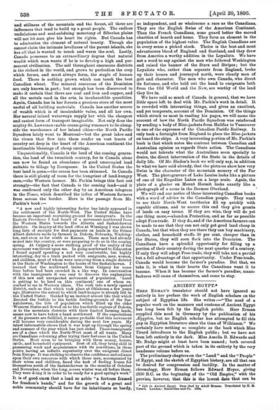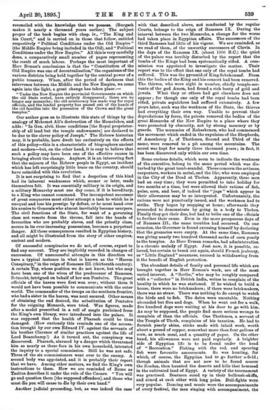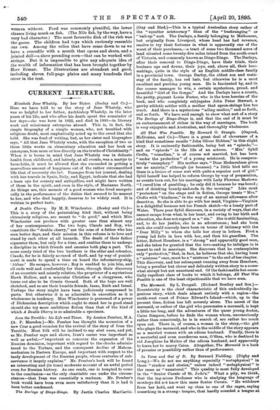ANCIENT EGYPT.* HERR ERMAN'S translator should not have ignored so
entirely in her preface the work of English scholars on the subject of Egyptian life. She writes :—" The need of a popular work on the manners and customs of Ancient Egypt has long been felt by the English public. Herr Erman supplied this need in Germany by the publication of his lEgypten, but no English scholar has attempted to fill this gap in Egyptian literature since the time of Wilkinson." We certainly have nothing so complete as the book which Miss Tirard introduces to the English public ; but we have not been left entirely in the dark. Miss Amelia B. Edwards and Mr. Budge might at least have been named ; both covered part of the ground which is taken in its entirety by the very handsome volume before us.
The preliminary chapters on the " Land " and the " People" of Egypt, and the sketch of Egyptian history, are all that can be desired for compression and lucidity. In the matter of chronology, Herr Erman follows Edward Meyer, giving 2830 B.C. as the beginning of the "Old Empire," with the proviso, however, that this is the lowest date that can be • Life in Ancient Ego& Dew ibed by Adolf Erman. Translated by H. M. Tirard. London : Macmillan and CO. 11394.
reconciled with the knowledge that we possess. (Burgsch makes it nearly a thousand years earlier.) The subject proper of the book begins with chap. iv., "The King and his Court," and is carried on in those that follow, entitled respectively "Political Conditions under the Old Empire" (the Middle Empire being included in the Old), and " Political Conditions under the New Empire." All this is very carefully done, a comparatively small number of pages representing the result of much labour. Perhaps the most important of Herr Erman's conclusions is that the "Constitution of the Old Empire was one of decentralisation," the organisms of the various districts being held together by the central power of a public treasury. When, after the period of darkness that intervenes between the Middle and the New Empire, we come again into the light, a great change has taken place :—
" Ender the New Empire the provincial Governments on which the old State rested, have entirely disappeared ; there are no longer any monarchs ; the old aristocracy has made way for royal officials, and the landed property has passed out of the hands of the old families into the possession of the Crown and the great temples."
Our author goes on to illustrate this state of things by the analogy of Mehemet Ali's destruction of the Mamelukes, and adds : "In Gen. xlvii. these conditions [the Royal proprietor- ship of all land but the temple endowments] are declared to be due to the clever policy of Joseph." The Hebrew historian may, it is probable, have dwelt too exclusively on the effects of this policy—this is a characteristic of biographers ancient and modern—but, on the other hand, it is easy to believe that such a policy may have been one of the effective causes in bringing about the change. Anyhow, it is an interesting fact that the sojourn of the Hebrew people in Egypt, an incident which has left surprisingly little trace on the country, should have coincided with this revolution.
It is not surprising to find that a despotism of this kind had its inherent weaknesses which, sooner or later, made themselves felt. It was essentially military in its origin, and a military Monarchy must one day come, if it is hereditary, to a King who cannot command. The incompetent successor of great conquerors must either attempt a task to which he is unequal and lose his prestige by defeat, or he must hand over his armies to Generals who almost inevitably become usurpers.
The civil functions of the State, for want of a governing class not remote from the throne, fall into the hands of favourites who are probably slaves, and the priestly class, secure in its ever-increasing possessions, becomes a perpetual danger. All these consequences resulted in Egyptian history, and all might be illustrated from the story of other empires, ancient and modern.
Of successful conspiracies we do not, of course, expect to find any account. They are implicitly recorded in changes of succession. Of unsuccessful attempts in this direction we have a typical instance in what is known as the "Harem Conspiracy," in the reign of Rameses III. (thirteenth century).
A certain Tey, whose position we do not know, but who may have been one of the wives of the predecessor of Rameses,
Setnaeht, intrigued on behalf of her son Pentuere. The great officials of the harem were first won over ; without them it
would not have been possible to communicate with the outer world. The commander of the troops on the southern frontier, who had a sister in the harem, was next secured. Other means of obtaining the end desired, the substitution of Pentare for the reigning Monarch, were tried. Wax figures, made after a model prescribed in a roll of magic purloined from the King's own library, were introduced into the palace. It was supposed that the health of Pharaoh could be thus damaged. (How curiously this reminds one of the accusa- tion brought by our own Edward IV. against the servants of his brother Clarence of similar practices against the life of Lord Beauchamp !) As it turned out, the conspiracy was discovered. Pharaoh, alarmed by a danger which threatened him so nearly as these foes in his own household, intrusted the inquiry to a special commission. Still he was not safe.
Three of the six commissioners went over to the enemy. A second body was appointed, and it is probably their report that we have. Among other matters, we find the King's own instructions to them. How we are reminded of Rome as Tacitus describes it under the rule of the Caesars. " You will go and question them [the supposed offenders], and those who must die you will cause to die by their own hand."
Another judicial proceeding, but, as was indeed the case
with that described above, not conducted by the regular Courts, belongs to the reign of Rameses IX. During the interval between the two Monarchs, a change for the worse had taken place in Egyptian affairs. The successors of the third Rameses had little of his vigour. We are reminded, as we read of them, of the unworthy successors of Clovis. In the days of the Rameses IX. (about 1100 B.C.) the quiet of the palace was terribly disturbed by the report that the tombs of the Kings had been systematically rifled. A com- mission was appointed to investigate the matter. Their report was to the effect that one only of the royal tombs had suffered. This was the pyramid of King Sebekemsaf. From this the bodies of the King and his consort had been removed. The thieves, who were eight in number, chiefly temple-ser- vants of the god Amon, had found a rich booty of gold and jewels. What they or others had got elsewhere does not appear ; for though one only of the royal tombs had been rifled, private sepulchres had suffered extensively. A few yews later, such was the weakness of the State, the thieves had everything their own way. Unable to prevent their depredations by force, the priests removed the bodies of the great Monarchs of the New Empire to a place where they were protected by obscurity, not by strong masonry or by guards. The mummies of Rahsekenen, who had commenced the movement which ended in the expulsion of the Shepherds, of Amenhotep I., of Thothmes, Second and Third of the name, were removed to a pit among the mountains. The secret was kept for nearly three thousand years ; in fact, it has been discovered only within our own time.
Some curious details, which seem to indicate the weakness of the executive, belong to the same period which was dis- turbed by the great tomb-scandal. These concern the artisans, carpenters, workers in metal, and the like, who were employed in the City of the Dead at Thebes. Apparently, these men had an easy time ; they were permitted to take holiday for two months at a time, but were allowed their rations of fish, pulse, corn, and beer, if indeed the " jugs " which appear in their allowances may be so interpreted. Unfortunately, the rations were not punctually issued, and the workmen had to strike. They began by stopping at home; afterwards they proceeded to demonstrate by going in a body to Thebes. Finally they got their due, but had to bribe one of the officials to further their cause. Even in the more prosperous days of of Rameses III., the same troubles had occurred. On one occasion, the Governor is found excusing himself by declaring that the granaries were empty. At the same time, Rameses was giving nearly two hundred thousand sacks of corn yearly to the temples. As Herr Erman remarks, bad administration is a chronic malady of Egypt. Just now, it is possible, re- lieved, but certain to break out again, should French jealousy, or "Little England" meanness, succeed in withdrawing from it the benefit of English protection.
The abundant details of family and personal life which are brought together in Herr Erman's work, are of the most varied interest. A "Scribe," who may be roughly compared with a "collector" in British India, writes to complain of the locality in which he was stationed. If he wished to build a house, there were no brickmakers ; if there were brickmakers, there was no straw. There was nothing to do except to watch the birds and to fish. The dates were uneatable. Nothing abounded but flies and dogs. When he went out for a walk, five hundred dogs were waiting at his door to go with him. As may be supposed, the people find more serious wrongs to complain of than the officials. One Thothmes, a servant of the Temple of Thoth, complains of his taxation. He had to furnish yearly skins, sticks made with inlaid work, worth about a pound of copper, somewhat more than four gallons of corn, as much meal, and a quantity of paper. On the other hand, his allowances were not paid regularly. A brighter side of Egyptian life is to be found under the head of " Recreation." Fishing with the rod, and spearing fish were favourite amusements. So was hunting, for which, of course, the Egyptian had to go further a-field ; though animals that are not now to be found nearer the Soudan, then haunted the deserts and hills that hemmed in the cultivated land of Egypt. A variety of the tournament was practised. Boatmen stood up in their bullrush-skiffs, and aimed at each other with long poles. Bull-fights were very popular. Dancing and music were the accompaniments of every festival, the men singing with accompaniment, the
women without. Food was commonly plentiful, the lower classes living much on fish. (The Nile fish, by the way, have a very bad character.) The most favourite dish of the rich was the goose. The children had toys which curiously resemble our own. Among the relics that have come down to us we have a crocodile with a mouth that opens and shuts, and a jointed doll—a slave pounding corn—that can be worked with strings. But it is impossible to give any adequate idea of the wealth of information that has been brought together by Herr Erman. The illustrations are abundant and good, including eleven full-page plates and many hundreds that occur in the text.




































 Previous page
Previous page